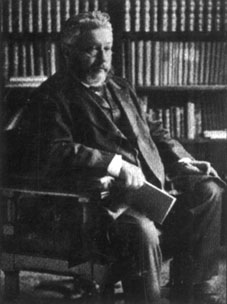Apr
10
2012
or The Practical Expression of Commonality in Primary Doctrinal Truth
Presbyterians and Baptists have a long history of working together. As is God’s way, any new endeavour must take the past into account but not be bound by it. This is a guest post by my friend Matt Carpenter.
The questions surrounding the origins and necessity of denominations have been discussed at great length and I don’t intend on bringing them up here. But it doesn’t mean we have a license to continue without giving it another thought. This isn’t another call for lip-quivering ecumenism. Fellow soldiers in God’s army can learn a lot from one another and the two groups I currently have in mind are Baptists and Presbyterians. Traditionally they have shared a lot in common.
Continue reading
2 comments | tags: Church History, Evangelism, Evolution, Humanism, Philosophy, Puritans, Revivalism, Spurgeon | posted in Christian Life, Creation, Quotes
Nov
15
2010

“Screw the truth into men’s minds.” – Richard Baxter
Doug Wilson, (in an interview a while back concerning Collision, I think), spoke about “copiousness.” It is the Christian’s practice of picking up striking thoughts and illustrations from reading, and from life, for future use. He advocates keeping a Commonplace book to jot things down.
“Keep a commonplace book. Write down any notable phrases that occur to you, or that you have come across. If it is one that you have found in another writer, and it is striking, then quote it, as the fellow said, or modify it to make it yours. If Chandler said that a guy had a cleft chin you could hide a marble in, that should come in useful sometime. If Wodehouse said somebody had an accent you could turn handsprings on, then he might have been talking about Jennifer Nettles of Sugarland. Tinker with stuff. Get your fingerprints on it.” [1]
He describes an incident that makes this book (or blog or mental practice) sound more like keeping caches of ammunition near at hand. Continue reading
2 comments | tags: Chesterton, Doug Wilson, Ecclesiastes, Hermeneutics, Revelation, Spurgeon, Tabernacles | posted in Apologetics, Biblical Theology, Christian Life, Quotes
Jun
11
2010

I’m sure I’ve seen the same look in Doug Wilson’s eyes.
The Bible and only the Bible is the ultimate and infallible spiritual authority in the lives of believers. We have fought a series of skirmishes over the infallibility of Scripture.
But, who today believes as Calvin did? Who today treats the Bible as Calvin did? Who today thinks that the Bible opened in the pulpit is a lit stick of dynamite, one that mere mortals are ordained to just throw out into the world? How many preachers have sermons on file that they would not dare to preach without purchasing some extra life insurance first?
Continue reading
Comments Off | tags: Calvin, Doug Wilson, Paul, Spurgeon | posted in Quotes
Jul
10
2009
Can trying to be relevant make a Christian irrelevant? John Piper writes:
Continue reading
Comments Off | tags: Culture, John Piper, Peter Leithart, Spurgeon | posted in Christian Life, Quotes
Apr
10
2009
“And you teachers, go on teaching the young the ways of God. In these days the State is giving them secular instruction all the day long, six days in the week; and religious teaching is greatly needed to balance it, or we shall soon become a nation of infidels.”
– C. H. Spurgeon (1834-1892)
Comments Off | tags: Spurgeon | posted in Quotes
Apr
10
2009
Revelation can become a mere distraction. Charles Spurgeon wrote about prophecy buffs:
“He is great upon the ten toes of the beast, the four faces of the cherubim, the mystical meaning of badgers’ skins, and the typical bearings of the staves of the ark, and the windows of Solomon’s temple: but the sins of business men, the temptations of the times, and the needs of the age, he scarcely ever touches upon. Such preaching reminds me of a lion engaged in mouse-hunting, or a man-of-war cruising after a lost water-butt.”*
That’s a fair comment if study of symbols becomes an end in itself, but they were intended to convey crucial information. Surely the symbolic passages have more authority than our own anecdotes when trying to communicate abstract truth? There is nothing in Revelation that isn’t also elsewhere in the New Testament. It was not intended to be an isolated book, and the better it is understood, the more powerfully it can be incorporated into our teaching and preaching.
*Charles Spurgeon, Lectures to My Students, p. 76.
Comments Off | tags: Apocalyptic, Revelation, Spurgeon, Typology | posted in Biblical Theology, Quotes
Apr
8
2009
[Posted by Gordon Cheng at www.solapanel.org]
I’ve appreciated reading the sermons of 19th-century Baptist preacher Charles Spurgeon over the years, and have quoted him on my blog a number of times (not as much as the Pyromaniacs, but still a bit).
 So when I came down with the flu and found myself in bed for three days straight, I thought it would be encouraging to pick up Arnold Dallimore’s short, well-researched biography of the man himself. Sick Calvinists of the world, unite. Spurgeon, so it happens, was a lot sicker than me for most of his life. He was seriously and often crippingly and painfully ill, both mentally (with depression) and physically, from his mid-30s until his death from illnesses at age 57. The same went for his wife Susannah who, because of chronic illness, was more often than not unable to attend the meetings where he preached.
So when I came down with the flu and found myself in bed for three days straight, I thought it would be encouraging to pick up Arnold Dallimore’s short, well-researched biography of the man himself. Sick Calvinists of the world, unite. Spurgeon, so it happens, was a lot sicker than me for most of his life. He was seriously and often crippingly and painfully ill, both mentally (with depression) and physically, from his mid-30s until his death from illnesses at age 57. The same went for his wife Susannah who, because of chronic illness, was more often than not unable to attend the meetings where he preached.
If you haven’t ever read any Spurgeon, do yourself a favour and pick up a book of his sermons where you can, or click through on some of the links in the first paragraph of this post to get just a small taste for his straight-talking, gospel-centred style. Of his Calvinism, Dallimore quotes him (p. 67 of my 1991 Banner of Truth edition) saying
We only use the term ‘Calvinism’ for shortness. That doctrine we call ‘Calvinism’ did not spring from Calvin; we believe that it sprang from the great founder of all truth.
Spurgeon never received any formal theological training, although he’d begun reading Bunyan’s The Pilgrim’s Progress and Foxe’s Book of Martyrs from the age of six, and progressed on to later Puritan writers such as John Owen and Richard Sibbes by the time he was 10.
Here are some other facts and figures I picked up on the way: Continue reading
Comments Off | tags: Biography, Paul, Spurgeon | posted in Quotes




























